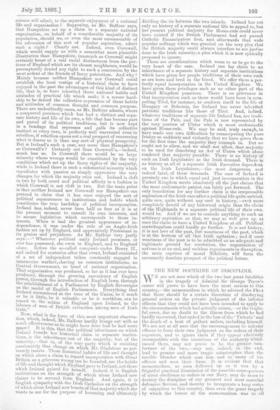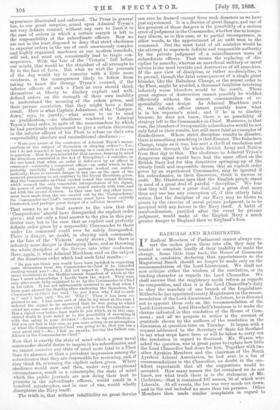THE NEW DOCTRINE OP DISCIPLINE.
WE are not sure which of the two last great fatalities in the tragedy of Admiral Sir George Tryon's career will prove to have been the most serious to this country,—the memorandum in which he advised the Fleet that there should be a certain discretion of disobeying general orders on the private judgment of the inferior officers that they could not have been intended to apply to the circumstances which had actually arisen,—or the fright- ful error, due no doubt to the illness from which he had hardly recovered, that ended in the loss of the 'Victoria' and the death of a host of gallant sailors, including himself. We are not at all sure that the encouragement to inferior officers to form their own judgment on the orders of their superiors, and to ignore them if they appear obviously incompatible with the intentions of the authority which issued them, may not prove to be the greater mis- fortune of the two,—may not, indeed; in the end, lead to greater and more tragic catastrophes than the terrible blunder which cost him and so many of his officers and men their lives. It is evident that that memorandum, so soon followed up as it was by a frightful practical illustration of the possible consequences of strict obedience to orders in our Navy, may do more to destroy the discipline of our greatest and most essential defensive Service, and thereby to inaugurate a long series of calamities to this country, than even the great tragedy by which the lesson of the memorandum was to all appearance illustrated and enforced. The Press in general has, to our great surprise, seized upon Admiral Tryon's not very definite counsel, without any care to limit it to the case of orders in which a certain margin is left to the responsibility of the subordinate officers. Now we are not in the least disposed to deny that strict obedience to superior orders in the use of such enormously complex and highly organised machines as our modern ironclads, will not, and must not, occasionally lead to tragic con- sequences. With the fate of the 'Victoria' full before our minds, that would be the stupidest of all attempts to fly in the face of facts. But what we wish the journals of the day would try to conceive with a little more vividness, is the consequences likely to follow from taking to heart Sir George Tryon's counsel, if the inferior officers of such a Fleet as ours should think themselves at liberty to disobey explicit and well- defined orders on the strength of their own inability to understand the meaning of the orders given, and their private conviction that they might have a fatal result. Here is what Captain Johnstone, of the Camper- down,' says, to justify,—what seems to us to need no justification,—the obedience rendered to Admiral Tryon's fatal order, in spite of the memorandum by which he had previously endeavoured to give a certain discretion to the inferior officers of his Fleet to refuse on their own responsibility absolute and unconditional obedience :— "Were you aware of the existence of Admiral Tryon's memo- randum on the subject of discretion in obeying orders P—Yes ; but I do not consider it has any bearing on a case such as the one in question.—How do you account for that answer, bearing in mind the directions contained in the Act of Discipline P—I consider, on the one hand, that when an order is delivered by an officer in command—naturally a competent officer—an order which he has probably carefully thought out, perhaps worked out mathe- matically, there is extreme danger in any one on the spur of the moment presuming to act contrary to the literal directions given. Had the Commander-in-Chief circled round the second division, which seemed the only reasonable interpretation of his signal, the power of avoiding the danger rested entirely with him, and not with the second division. In that case had any other move- ment been made than the one carried out by the Camperdown,' the Commander-in-Chief's intentions must have been entirely frustrated, and perhaps groat danger of a collision incurred."
That seems to us a final answer to the view that the Camperdown should have disregarded the explicit order given ; and not only a final answer to the plea in this par- ticular case, but to the view that an explicit and perfectly definite order given by a responsible Commander to those under his command could ever be safely disregarded. There is danger, no doubt, in obeying such commands, as the fate of the ` Victoria ' amply shows ; but there is infinitely more danger in disobeying them, and so throwing the whole discipline of the Service into utter confusion. Here, again, is what Admiral Markham said on the subject of the disastrous order which had such fatal results :— " Do you not think you would have been justified in expecting some intimation from the Commander-in-Chief if he intended circling round you P—No, I did not expect it. There have been many evolutions in the Mediterranean Squadron of which at the time I must acknowledge I hardly knew the object. They were only afterwards fully explained to us by the Commander-in-Chief in his cabin. It has not infrequently occurred to me that when I have gone aboard the flagship after anchoring the Squadron, the Commander-in-Chief has said, 'Do you know why I did so-and- so P) and I have said, No, sir. Why ?' Then it has been ex- plained to me. I bad some sort of idea in my mind at the time I ordered the signal to be answered that he was going to wheel round me, come out on the other side, and re-form the squadron.— Has a signal ever before been made to you which, as in this case, caused doubt in your mind as to the possibility of executing it with due safety to your division P—Never, in my recollection.— Did you not feel in this case, as you were acting on an assumption ,of what the Commander-in-Chief was going to do, that you ran a very great risk ?.-No ; I felt no anxiety, having the fullest con- fidence in the Commander-in-Chief."
Now that is exactly the state of mind which a great naval commaneler should desire to inspire in his subordinates, and we cannot conceive any state of mind more fatal to a Fleet than its absence, or than a prevalent impression among the subordinates that they are responsible for reviewing, and, if they think fit, reversing the explicit orders given. Where obedience would now and then, under very exceptional circumstances, result in a catastrophe, the state of mind which the public journals are now doing their best to promote in the subordinate officers, would result in a hundred catastrophes, and in ease of war, would wholly disorganise the Navy itself.
The truth is, that without infallibility no great Service can ever be deemed exempt from such disasters as we have just experienced. It is a Service of great danger, and one of the greatest of these dangers is the possibility of a serious error of judgment in the Commander, whether due to tempo- rary illness, as in this case, or to partial incompetence, in other words, to the appointment of an unfit man to the command. But the most fatal of all mistakes would be the attempt to supersede definite and responsible authority by the private judgment of a miscellaneous mass of subordinate officers. That means the replacing of dis- cipline by anarchy, whereas an anarchical military or naval service is the most terrible and destructive of all anarchies.
If the new view of discipline, or rather no-discipline, is to prevail, though the fatal consequences of a single great blunder, like the Balaclava Charge, or the recent order to the Fleet, might be avoided, a thousand fatalities involving infinitely worse blunders would be the result. These great engines of destruction cannot possibly be wielded effectively without the utmost concentration of re- sponsibility and design. As Admiral Markham puts it, the inferior officer cannot possibly know what is in his superior's mind ; and if he is to disobey because he does not know, there is no possibility of strategy left to the Commander-in-Chief. Moreover, in that case, the blunders of irresponsible subordinates would be not only fatal in their results, but still more fatal as examples of disobedience. Where strict discipline results in disaster, there is something ennobling in that disaster. The Balaclava Charge, tragic as it was, has sent a thrill of emulation and admiration through the whole British Army and Nation from that day to this. The obedience to Admiral Tryon's dangerous signal would have had the same effect on the British Navy but for this disastrous springing-up of the utterly futile and impossible dream that an ex,plicit order given by an experienced Commander, may be ignored if his subordinates, in their discretion, think it unwise or unfit Mr. Gladstone says that the English people stand in need of a great deal of painful "discipline." We fear that they will incur a great deal, and a great deal more than any one has any conception of, if this utterly fatal notion that the discipline of our Navy may be blown to pieces by the exercise of naval private judgment, is to be accepted with any favour in the Navy itself. A habit of insubordination, justified after the event by private judgment, would make of the English Navy a much greater danger to England than to England's foes.



































 Previous page
Previous page